版培养方案课程设置(中英文对照)
- 格式:doc
- 大小:267.00 KB
- 文档页数:4
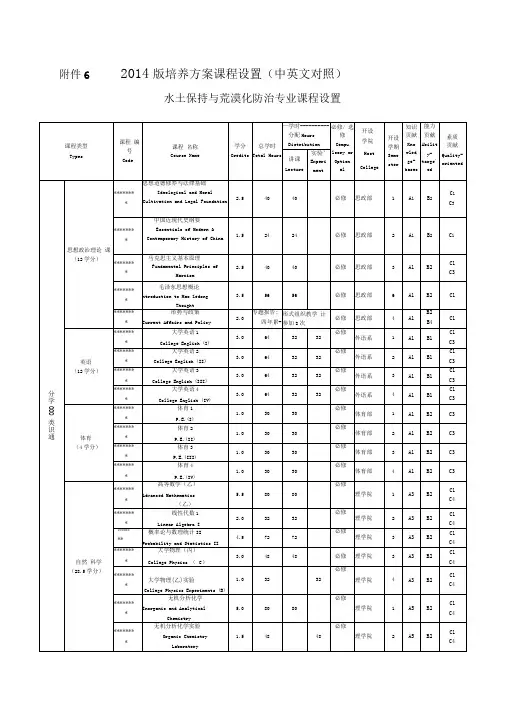
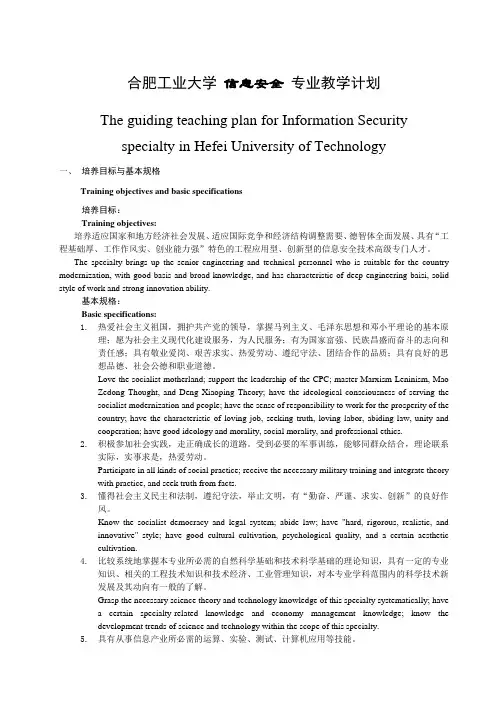
合肥工业大学信息安全专业教学计划The guiding teaching plan for Information Securityspecialty in Hefei University of Technology一、培养目标与基本规格Training objectives and basic specifications培养目标:Training objectives:培养适应国家和地方经济社会发展、适应国际竞争和经济结构调整需要、德智体全面发展、具有“工程基础厚、工作作风实、创业能力强”特色的工程应用型、创新型的信息安全技术高级专门人才。
The specialty brings up the senior engineering and technical personnel who is suitable for the country modernization, with good basis and broad knowledge, and has characteristic of deep engineering baisi, solid style of work and strong innovation ability.基本规格:Basic specifications:1.热爱社会主义祖国,拥护共产党的领导,掌握马列主义、毛泽东思想和邓小平理论的基本原理;愿为社会主义现代化建设服务,为人民服务;有为国家富强、民族昌盛而奋斗的志向和责任感;具有敬业爱岗、艰苦求实、热爱劳动、遵纪守法、团结合作的品质;具有良好的思想品德、社会公德和职业道德。
Love the socialist motherland; support the leadership of the CPC; master Marxism-Leninism, Mao Zedong Thought, and Deng Xiaoping Theory; have the ideological consciousness of serving the socialist modernization and people; have the sense of responsibility to work for the prosperity of the country; have the characteristic of loving job, seeking truth, loving labor, abiding law, unity and cooperation; have good ideology and morality, social morality, and professional ethics.2.积极参加社会实践,走正确成长的道路。
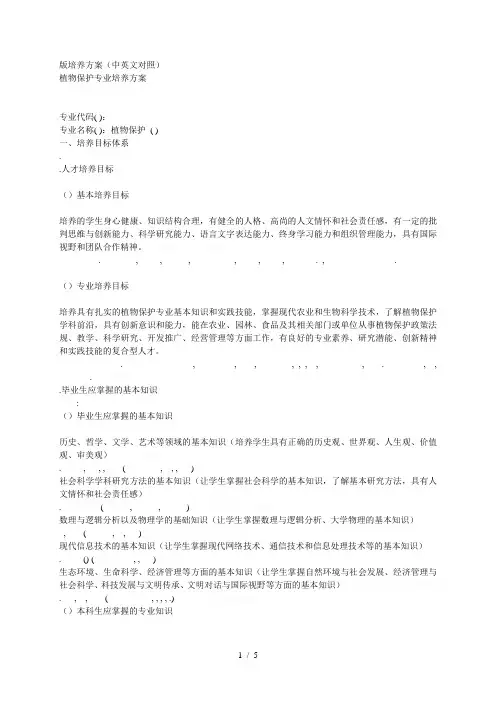
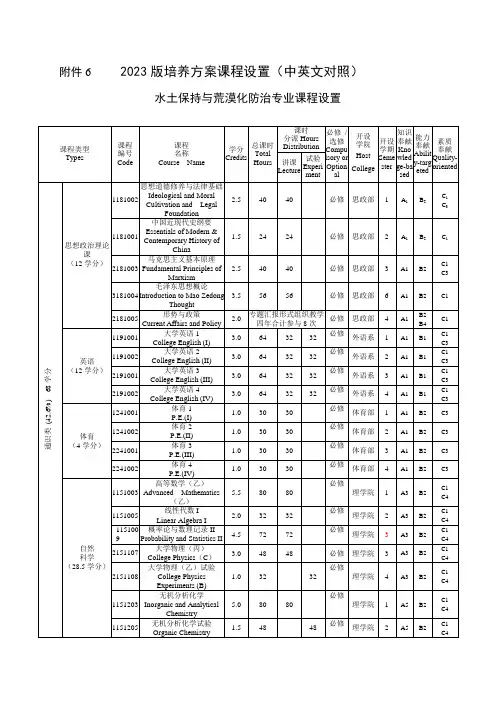
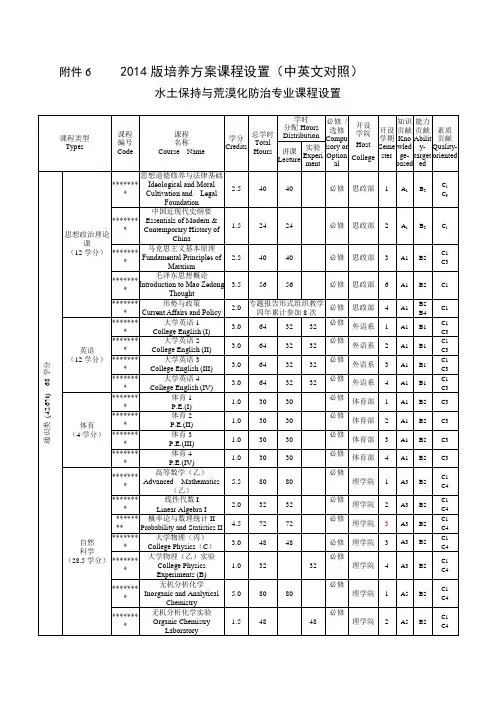
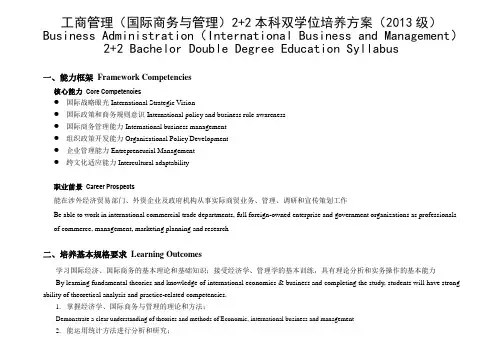
工商管理(国际商务与管理)2+2本科双学位培养方案(2013级)Business Administration(International Business and Management)2+2 Bachelor Double Degree Education Syllabus一、能力框架Framework Competencies核心能力Core Competencies●国际战略眼光International Strategic Vision●国际政策和商务规则意识International policy and business rule awareness●国际商务管理能力International business management●组织政策开发能力Organizational Policy Development●企业管理能力Entrepreneurial Management●跨文化适应能力Intercultural adaptability职业前景Career Prospects能在涉外经济贸易部门、外资企业及政府机构从事实际商贸业务、管理、调研和宣传策划工作Be able to work in international commercial trade departments, full foreign-owned enterprise and government organizations as professionals of commerce, management, marketing planning and research二、培养基本规格要求Learning Outcomes学习国际经济、国际商务的基本理论和基础知识;接受经济学、管理学的基本训练,具有理论分析和实务操作的基本能力By learning fundamental theories and knowledge of international economics & business and completing the study, students will have strong ability of theoretical analysis and practice-related competencies.1.掌握经济学、国际商务与管理的理论和方法;Demonstrate a clear understanding of theories and methods of Economic, international business and management2.能运用统计方法进行分析和研究;Analyze and research by utilizing statistics method3.了解主要国家和地区的经济发展状况及其商务政策;Understand current economic situation and business policies of major countries and regional areas4.了解中国的经济政策和法规;Illustrate Chinese economic policies and regulations5.了解国际经济学、国际商务与管理理论发展的动态;Identify the development trend of international economy and international business & management6.能够熟练地掌握一门外语,具有听、说、读、写、译的基本能力,能利用计算机从事涉外经济工作。
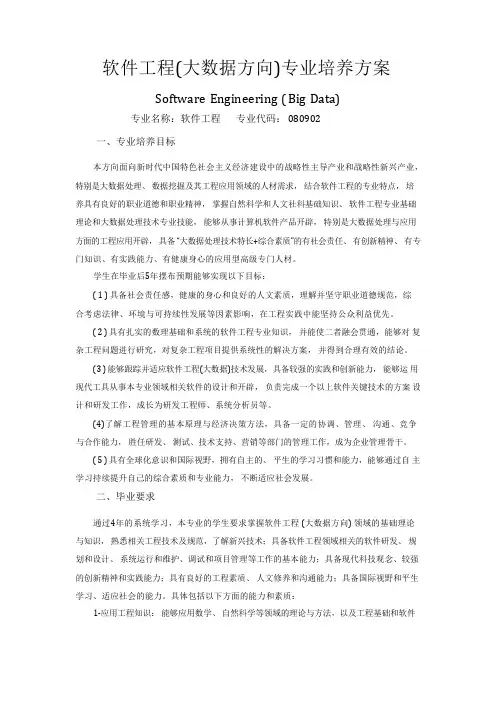
软件工程(大数据方向)专业培养方案Software Engineering (Big Data)专业名称:软件工程专业代码: 080902一、专业培养目标本方向面向新时代中国特色社会主义经济建设中的战略性主导产业和战略性新兴产业,特别是大数据处理、数据挖掘及其工程应用领域的人材需求,结合软件工程的专业特点,培养具有良好的职业道德和职业精神,掌握自然科学和人文社科基础知识、软件工程专业基础理论和大数据处理技术专业技能,能够从事计算机软件产品开辟,特别是大数据处理与应用方面的工程应用开辟,具备“大数据处理技术特长+综合素质”的有社会责任、有创新精神、有专门知识、有实践能力、有健康身心的应用型高级专门人材。
学生在毕业后5年摆布预期能够实现以下目标:( 1 ) 具备社会责任感,健康的身心和良好的人文素质,理解并坚守职业道德规范,综合考虑法律、环境与可持续性发展等因素影响,在工程实践中能坚持公众利益优先。
( 2 ) 具有扎实的数理基础和系统的软件工程专业知识,并能使二者融会贯通,能够对复杂工程问题进行研究,对复杂工程项目提供系统性的解决方案,并得到合理有效的结论。
( 3 ) 能够跟踪并适应软件工程(大数据)技术发展,具备较强的实践和创新能力,能够运用现代工具从事本专业领域相关软件的设计和开辟,负责完成一个以上软件关键技术的方案设计和研发工作,成长为研发工程师、系统分析员等。
(4)了解工程管理的基本原理与经济决策方法,具备一定的协调、管理、沟通、竞争与合作能力,胜任研发、测试、技术支持、营销等部门的管理工作,成为企业管理骨干。
( 5 ) 具有全球化意识和国际视野,拥有自主的、平生的学习习惯和能力,能够通过自主学习持续提升自己的综合素质和专业能力,不断适应社会发展。
二、毕业要求通过4年的系统学习,本专业的学生要求掌握软件工程 (大数据方向) 领域的基础理论与知识,熟悉相关工程技术及规范,了解新兴技术;具备软件工程领域相关的软件研发、规划和设计、系统运行和维护、调试和项目管理等工作的基本能力;具备现代科技观念、较强的创新精神和实践能力;具有良好的工程素质、人文修养和沟通能力;具备国际视野和平生学习、适应社会的能力。
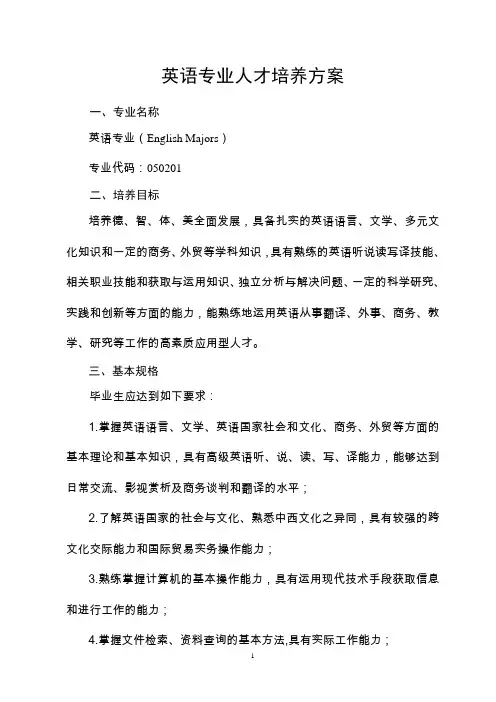
英语专业人才培养方案
一、专业名称
英语专业(English Majors)
专业代码:050201
二、培养目标
培养德、智、体、美全面发展,具备扎实的英语语言、文学、多元文化知识和一定的商务、外贸等学科知识,具有熟练的英语听说读写译技能、相关职业技能和获取与运用知识、独立分析与解决问题、一定的科学研究、实践和创新等方面的能力,能熟练地运用英语从事翻译、外事、商务、教学、研究等工作的高素质应用型人才。
三、基本规格
毕业生应达到如下要求:
1.掌握英语语言、文学、英语国家社会和文化、商务、外贸等方面的基本理论和基本知识,具有高级英语听、说、读、写、译能力,能够达到日常交流、影视赏析及商务谈判和翻译的水平;
2.了解英语国家的社会与文化、熟悉中西文化之异同,具有较强的跨文化交际能力和国际贸易实务操作能力;
3.熟练掌握计算机的基本操作能力,具有运用现代技术手段获取信息和进行工作的能力;
4.掌握文件检索、资料查询的基本方法,具有实际工作能力;
5.掌握一门第二外国语的基本技能和基础知识;
6.具有较强的语言文字表达、沟通、团队协作和与人相处的能力,具有较强的社会活动和组织管理能力。
四、学制与修业年限
学制四年;修业年限3-8年
五、授予学位
文学学士
六、专业核心课程
基础英语、高级英语、英语阅读、英语视听说、英语口语、英语写作、英语国家概况、英美文学、语言学导论、英汉互译和口译。
七、全学程时间分配
八、毕业基本要求
九、课程设置与教学进程一览表
表Ⅰ必修课课程设置与教学进程一览表英语专业
4
5
6
表Ⅱ选修课课程设置一览表英语专业
7
8。
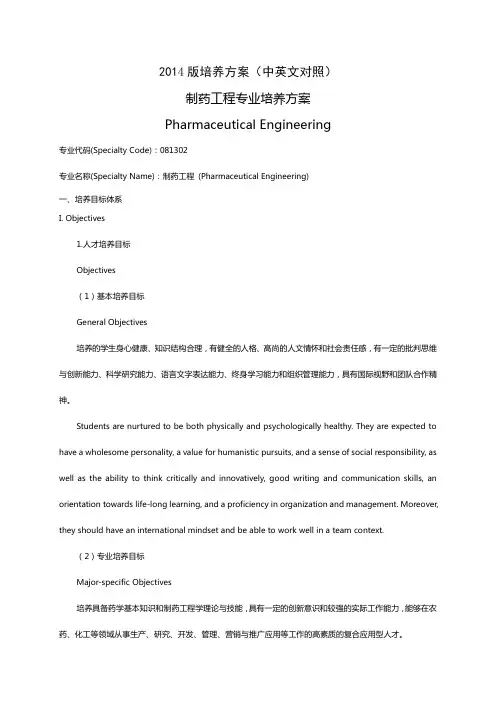
2014版培养方案(中英文对照)制药工程专业培养方案Pharmaceutical Engineering专业代码(Specialty Code):081302专业名称(Specialty Name):制药工程(Pharmaceutical Engineering)一、培养目标体系I. Objectives1.人才培养目标Objectives(1)基本培养目标General Objectives培养的学生身心健康、知识结构合理,有健全的人格、高尚的人文情怀和社会责任感,有一定的批判思维与创新能力、科学研究能力、语言文字表达能力、终身学习能力和组织管理能力,具有国际视野和团队合作精神。
Students are nurtured to be both physically and psychologically healthy. They are expected to have a wholesome personality, a value for humanistic pursuits, and a sense of social responsibility, as well as the ability to think critically and innovatively, good writing and communication skills, an orientation towards life-long learning, and a proficiency in organization and management. Moreover, they should have an international mindset and be able to work well in a team context.(2)专业培养目标Major-specific Objectives培养具备药学基本知识和制药工程学理论与技能,具有一定的创新意识和较强的实际工作能力,能够在农药、化工等领域从事生产、研究、开发、管理、营销与推广应用等工作的高素质的复合应用型人才。
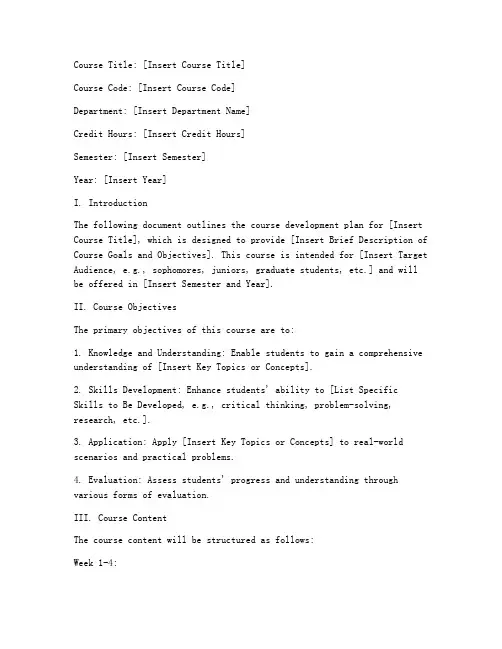
Course Title: [Insert Course Title]Course Code: [Insert Course Code]Department: [Insert Department Name]Credit Hours: [Insert Credit Hours]Semester: [Insert Semester]Year: [Insert Year]I. IntroductionThe following document outlines the course development plan for [Insert Course Title], which is designed to provide [Insert Brief Description of Course Goals and Objectives]. This course is intended for [Insert Target Audience, e.g., sophomores, juniors, graduate students, etc.] and will be offered in [Insert Semester and Year].II. Course ObjectivesThe primary objectives of this course are to:1. Knowledge and Understanding: Enable students to gain a comprehensive understanding of [Insert Key Topics or Concepts].2. Skills Development: Enhance students' ability to [List SpecificSkills to Be Developed, e.g., critical thinking, problem-solving, research, etc.].3. Application: Apply [Insert Key Topics or Concepts] to real-world scenarios and practical problems.4. Evaluation: Assess students' progress and understanding through various forms of evaluation.III. Course ContentThe course content will be structured as follows:Week 1-4:- Introduction to [Insert Key Topic]- Fundamental Concepts and Theories- Historical Context and DevelopmentWeek 5-8:- Advanced Topics and Current Research- Case Studies and Examples- Analysis and EvaluationWeek 9-12:- Application Projects and Assignments- Collaborative Work and Group Discussions- Final Project or Exam PreparationIV. Teaching and Learning MethodsThe teaching and learning methods for this course will include:- Lectures: Traditional lectures to introduce key concepts and theories.- Discussion: Interactive discussions to promote critical thinking and engage students in the learning process.- Case Studies: Analysis of real-world scenarios to enhance practical application skills.- Group Work: Collaborative projects to develop teamwork and communication skills.- Online Resources: Utilization of online platforms and resources for supplementary learning and self-study.V. Assessment MethodsStudents will be assessed through the following methods:- Quizzes: Short quizzes to evaluate understanding of key concepts and theories.- Assignments: Written assignments to demonstrate knowledge and critical thinking skills.- Midterm Exam: Comprehensive exam to assess overall understanding of the course material.- Final Project: An in-depth project that applies course concepts to a real-world scenario.- Participation: Active participation in class discussions and group activities.VI. Evaluation CriteriaThe evaluation criteria for this course will be based on:- Knowledge and Understanding: Ability to demonstrate a deep understanding of the course material.- Skills Development: Application of skills such as critical thinking, problem-solving, and research.- Application: Ability to apply course concepts to real-world scenarios.- Evaluation: Quality of written work, clarity of presentation, and participation in discussions.VII. Course ResourcesThe following resources will be provided to support student learning:- Textbooks: [List Required Textbooks and Authors]- Readings: Recommended readings from scholarly journals and other academic sources.- Online Resources: Access to online databases, articles, and other educational materials.- Supplementary Materials: Handouts, videos, and other teaching aids.VIII. ConclusionThe [Insert Course Title] course is designed to provide students with a comprehensive understanding of [Insert Key Topics or Concepts]. Through a combination of lectures, discussions, case studies, and practical projects, students will develop the necessary knowledge and skills to succeed in their academic and professional endeavors. This course development plan outlines the structure, teaching methods, assessment methods, and resources that will support the achievement of these goals.Note: This template is a general guide and should be customized to fit the specific requirements and goals of the course.。
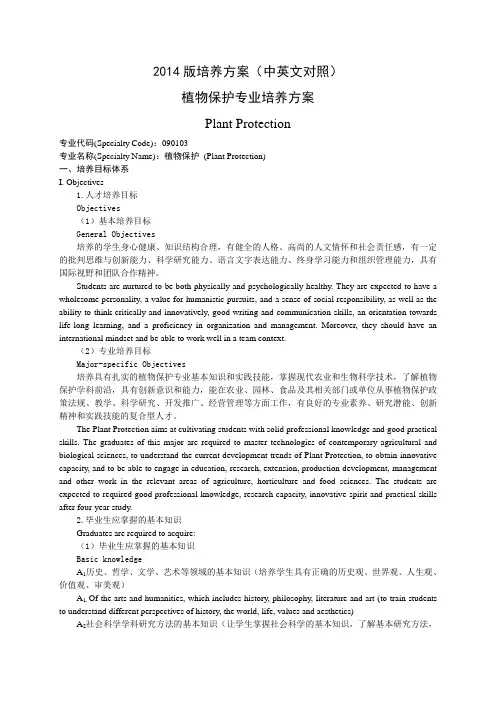
2014版培养方案(中英文对照)植物保护专业培养方案Plant Protection专业代码(Specialty Code):090103专业名称(Specialty Name):植物保护(Plant Protection)一、培养目标体系I. Objectives1.人才培养目标Objectives(1)基本培养目标General Objectives培养的学生身心健康、知识结构合理,有健全的人格、高尚的人文情怀和社会责任感,有一定的批判思维与创新能力、科学研究能力、语言文字表达能力、终身学习能力和组织管理能力,具有国际视野和团队合作精神。
Students are nurtured to be both physically and psychologically healthy. They are expected to have a wholesome personality, a value for humanistic pursuits, and a sense of social responsibility, as well as the ability to think critically and innovatively, good writing and communication skills, an orientation towards life-long learning, and a proficiency in organization and management. Moreover, they should have an international mindset and be able to work well in a team context.(2)专业培养目标Major-specific Objectives培养具有扎实的植物保护专业基本知识和实践技能,掌握现代农业和生物科学技术,了解植物保护学科前沿,具有创新意识和能力,能在农业、园林、食品及其相关部门或单位从事植物保护政策法规、教学、科学研究、开发推广、经营管理等方面工作,有良好的专业素养、研究潜能、创新精神和实践技能的复合型人才。
化学专业培养方案Undergraduate Program for Specialty in Chemistry学科门类:专业代码:一、专业培养目标化学专业培养具有高度的社会责任感,良好的科学、文化素养,扎实的化学基础知识、基本理论及基本技能,具有创新精神、实践能力和发现并解决化学化工生产及课题研究中的科学问题的能力,能够在化学及相关学科领域从事科学研究、技术开发、研发管理及教育教学等工作的专门人才。
二、专业培养要求(一)化学专业培养要求如下:知识要求:1.1通识教育知识:具有良好的文化素质,具备基本的工程经济、管理、信息交流、法律、环境等人文与社会学的知识;1.2学科基础知识:掌握扎实的数学、物理等自然科学基础,为进行化学科学研究提供计算和推演的知识和理论基础;1.3专业知识:掌握全面的化学专业基本知识和理论,能够利用相关基础知识和理论分析和解释化工生产项目或化学科学课题研究中的发生的现象和表现的规律,并能运用相关专业知识制定和优化生产工艺或课题研究的方案及方法;1.4实践与创业知识:包括化学实验知识、化学工程实验知识、工程训练知识、企业实习实践知识、科研实践知识、创新创业实践及社会实践知识等。
技能要求:2.1业务能力(1)具备运用本专业基本理论知识和工程基础知识解决问题的能力;(2)掌握化学实验的基础知识、理论和操作技能,并具有对化学物质或材料进行检测和分析的一般原理、方法和仪器及相关仪器使用程序,具备检测、分析和表征物质组成、结构和性质的能力;(3)掌握文献检索、资料查询及运用现代信息技术获取相关信息的基本方法;(4)具有一定的组织管理能力、表达能力和人际交往能力以及团队合作能力;(5)对终身学习有正确认识,具有不断学习和适应发展的能力;(6)具有一定的国际视野和跨文化交流、竞争与合作能力。
2.2实践与应用能力(1)了解计算机应用方面的基本知识和软件程序的运行原理,能够顺利检索、安装、更新和使用相关软件,能够顺利检索和阅读相关课题的科技文献资料,能够及时了解本学科或研究方向的研究背景、现状和前沿,能够利用英语进行学习、表达、书写和交流能力;(2)初步掌握化工生产的基础知识和工艺流程,为化学专业知识和理论的应用提供专业基础和实践认识,具备科研成果转化和实际课题研发的能力。
翻译专业培养方案范本1、学制标准学制为四年,学生可在3—6年内完成学业。
2、学分要求学生至少应修满160学分方可毕业。
其中:必修115学分,选修45学分;课堂教学129学分,实践教学31学分。
学校平台课程中,学生应修满53学分,其中:必修35学分,选修18学分;课堂教学42学分,实践活动11学分。
学院平台课程中,学生应修满4学分,其中:必修4学分,选修0学分;课堂教学4学分,实践教学0学分。
专业平台课程中,学生应修满103学分,其中:必修76学分,选修27学分;课堂教学83学分,实践教学20学分。
详细课程与学分详见本方案的课程设置部分。
综合英语、英语听辨、英语读译、初级笔译、中级笔译、笔译工作坊、交替口译、口译工作坊、计算机辅助翻译、CATTI专题、翻译理论导读五、授予学位文学学士每学年设置2个学期,共40周,其中教学时间36周(每学期18周),考试时间4周(每学期2周),并适当安排入学教育、军事训练、生产劳动、社会实践、毕业教育、就业指导等时间。
课堂教学共129学分,占毕业总学分的80.6%;实践教学共31学分,占毕业总学分的19.4%。
1、课堂教学2、实践教学专业实习6学分,认知实习(见习)2学分,学年论文2学分,毕业论文(设计)6学分,素质拓展与实践创新4学分。
注:(1)周学时按照“理论课周学时+实验课周学时”的形式给出;(2)选修课周学时按照各类课程原那么上的修读学期和应修学分,分学期平均计入。
(一)学校平台课程(普通教育课程)1、公共根底教育课程模块本模块课程共20学分,其中,必修18学分,任选2学分,课堂教学13学分,实践教学7学分。
(2)第二外语课程模块(学生须在本模块中完成14学分)(3)体育与安康课程模块(学生须在本模块中完成4学分必修课程并通过大学生体质安康测试)“大学生体质安康标准测试”以学生自主锻炼为主,四年不断线,学校每学年集中组织一次测试,测试不合格者不能毕业。
详细要求见《西北师范大学〈学生体质安康标准〉实施(试行)》(西师发[xx]135号)。
[专业中文名称(三号黑体字)](学科代码:)学科简介(400字以内)【学科简介】楷体_GB2312小四号书写培养目标(150字以内,以下内容仅供参考)掌握马克思主义基本原理,坚持四项基本原则,热爱祖国,遵纪守法,品行端正,具有为人民服务和为社会主义建设事业献身的精神。
在、、、等方面,具有坚实、宽广的理论基础和系统深入的专门知识。
具有独立开展科学研究和解决有关技术问题的能力。
能胜任、、等方面的工作。
至少熟练掌握一门外语。
研究方向[一级学科最多10个研究方向、二级学科一般为3—4个](楷体_GB2312小四号书写)培养年限培养年限一般为4-5年,最长可延至7年。
学分要求和课程设置(见附表)学位论文[文献阅读要求、学位论文撰写要求、发表成果要求等方面](楷体_GB2312小四号书写)文献阅读(仅供参考,下同)在论文选题及研究方向范围内至少阅读文献50篇,其中外文文献篇,完成一篇综述。
论文撰写除符合学校规定外,学位论文必须是一篇系统、完整的学术论文,要求概念清楚、立论正确、论述严谨、计算正确、数据可靠,且层次分明、文笔简洁、流畅、图标清晰。
论文学术水平博士论文应有一定的深度和广度,要求达到:具有明显的创新性,部分研究内容应达到国际先进水平,并具有一定涵盖面。
学位论文的研究结果应有新发现、新见解,对本学科的学术发展具有一定的指导意义。
围绕论文开展科研工作的时间不少于2年。
本学科申请博士学位前至少要发表……注:1. 直博生在校期间课程总学分最低要求为:理工类35学分,医学类37学分。
其中硕士专业学位课至少10学分,博士专业学位课至少5学分。
此外,还应完成必修环节3学分。
2.直博生全部课程学分一般应在入学后的一年半时间内完成。
3.学位课程根据此表,非学位课程从“研究生课程目录”中选择。
培养方案审批意见Discipline:(Discipline Code:)Brief Introduction of Discipline (within 400 words)Training Objectives (about 150 words, the following content is for reference only) Students will grasp the fundamental principles of Marxism, stick to the four cardinalprinciples, abide by the laws and regulations, love the motherland and behave upright. Meanwhile, the students will develop their spirit of serving the people and devoting to the construction of socialism.Students will acquire solid and broad theoretical principle as well as systematical and in-depth professional knowledge in the field of _____, ______, ______ etc. Also the students will have the capability of doing scientific research independently and solving relevant technical problems. They will be competent for ______, ______, ______ etc.Students will be fluent in at least one kind of foreign languages.Research Direction〔First-class discipline contains a maximum of 10 research directions. Second-class discipline generally has 3-4 research directions.〕Training PeriodThe program usually lasts five years and might be extended to 6 years.Credit requirements and curriculum (refer to the attached list)Thesis〔Literature reading requirements, thesis written request, publication achievement requirements etc.〕Literature Reading(for reference only, the same below)Students are required to read at least 50 literatures on topics related to their thesis and research direction inc luding ** literatures in foreign languages and to write a literature overview.Thesis WritingIn addition to compliance with the provisions of school, thesis must be written in a systematic and complete manner, presenting clear concepts, correct argument, realistic description, concise writing structure, smooth and concise writing style,correct calculation, reliable data, and clear icons.Thesis EvaluationThesis should be written with a certain depth, width and distinctive creativeness. Some part of the research should reach the advanced world levels. The findings and conceptions presented in the thesis conclusion should be new and have positive impact on academic development of this discipline. Students are required to conduct at least two years research on the thesis and to publish at least ___ papers in the area of their disciplines before being eligible for applying for a PhD degree.Note:1. The minimum total-credit requirements of Master's curricula:35 credits for students of science and engineering;37 credits for students of medical science. (The minimum credit require ment of Master’s degree courses is 10credits and the minimum credit requirement of Doctoral degree courses is 5 credits.) In addition, studentsshould obtain 3 credits from compulsory courses.2. The students are normally required to complete all the course credits within one and a half years afterregistration.3. Degree courses are subject to this course plan, non-degree courses can be chosen from ‘Graduate Courses Catalog’.。